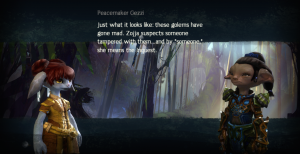“One of the crucial insights from the research is that toxic behavior doesn’t necessarily come from terrible people; it comes from regular people having a bad day,” said Justin Reich, research scientist from Harvard’s Berkman Center. “That means that our strategies to address toxic behavior online can’t be targeted just at hardened trolls; they need to account for our collective human tendency to allow the worst of ourselves to emerge under the anonymity of the Internet.”
Simon Parkin, “A Video-Game Algorithm to Solve Online Abuse”, MIT Technology Review, September 14, 2015.
In my experiences playing thus far, I have not engaged in conversation with the game, but have consulted other internet resources, as well as discussing it with friends who have played the game before. I have not been approached within the game itself, and to be perfectly honest, have been too scared to start a conversation, because of thoughts such as “What would I say? Will they think I’m ‘dumb’? What if they tell others about me? What will they think of me?” and similar rabbit holes. In my mind, this has led to me negotiating my own internalized discourses around asking for help and when that is necessary, and my solution so far has been to simply Google it and see if I can solve the problem myself first, which I have been able to.
Interestingly, my anonymity has actually made me less inclined to speak up, for I feel that I might be misconstrued within this very specific context, as opposed to real-life interaction, where I feel I can always redeem myself. At least when I ask a question to someone in person, I can compensate for my lack of knowledge in one area by contributing to the conversation in others. I have had past experiences with anonymous forms of social media that have led to some interesting insights about people’s perceived anonymity and therefore lack of boundaries, but for me in this instance, it was the opposite.
For this reason, I was very grateful for those who created resources outside of the game to help answer basic questions about format, movement, quests, etc. As a game that is played on a computer on the internet, the lines about what is considered “cheating” become increasingly blurry for me, and I have a difficult time drawing hard lines on this issue. Personally, I do not consider it a transgression simply because of the format of the game itself, whereas I would feel differently if it was an in-person game that people temporarily exited to google a solution. Perhaps this is my own bias and lack of familiarity, but it does seem to me that within the context of an MMORPG, there is no cheating.
Overall, the mid-game interactions in this game have honestly been quite a huge barrier for me, but they have led me to address some of my own internalized thought forms that I thought were long gone, which has proved quite useful and interesting.
